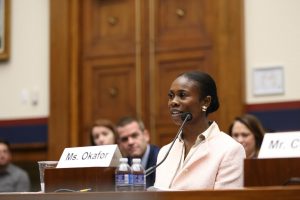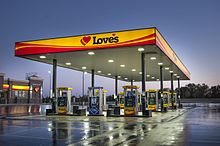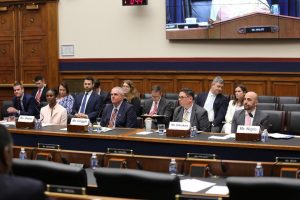
A Congressional subcommittee exploring the government’s attempt to create an EV and alternative fuel movement nationwide was cautioned by an official of Oklahoma City-based Love’s Travel Stops to allow private enterprise and consumers develop the transition…not the government.
Kim Okafor, General Manager of Zero Emission Solutions for Love’s Travel Stops and Trillium Energy testified before the House Subcommittee on Highways and Transit of the Committee on Transportaation and Infrastructure during a hearing on “It’s Electric: A Review of Fleet Electrification Efforts.”
“Many seem to think that a transition to electric transportation energy requires creating an entirely new refueling network. That is not the case. The U.S. already has in place a robust, highly competitive refueling network,” she stated in her testimony.

“Fuel retailers are in the business of providing competitively priced fuel and services to their customers. Unlike power
generators, refiners, or biofuels producers, fuel retailers are agnostic to the type of fuel they sell at their locations; their goal is to provide customers what they want, where they want it, when they want it, and at a price they are willing to pay.”

She told the subcommittee any new program of electric or alternative fuels for U.S. travel should be what consumers have come to expect including 24-hour access, foodservice, security, restrooms and lighting.
The federal government has poured hundreds of millions of dollars to state to develop Interstate highway EV charging networks. But Okafor said the commercial operators are better suited for the development.

“Fuel retailers are best positioned to provide alternative
sources of transportation energy because we have a keen understanding of on-the-go refueling preferences based on decades of studying them. This fact is essential when it comes to adoption of EVs or other alternative fuel vehicles.”
She added for any solution to work, it must promote competitive market dynamics.
“If policy does that and ensures a functioning private market, then private dollars will make sure infrastructure is there to meet consumers’ needs. If that is not done, it is likely that any public
dollars spent will be stranded and wasted in ways that do not serve an appreciable number of consumers and cost far more than any benefit they produce.”
Okafor testified on behalf of NATSO, representing truck stops and travel plazas, and SIGMA: America’s Leading Fuel Marketers. NATSO and SIGMA, which represent approximately 80 percent of fuel sold at retail, support policies that incentivize fuel retailers to invest in alternative fuels.
Fuel retailers are at the forefront of investments in new refueling technologies and their required infrastructure. The industry is actively participating in the National Electric Vehicle
Infrastructure (NEVI) grant program in almost every state, and more than half of all EV charging stations under the NEVI grant program are set to be constructed at truck stops, travel centers, and other fuel retailers. Incentivizing fuel retailers and their nationwide network to offer more alternative fuels while providing consumers with the ongoing, positive refueling experience they expect will facilitate a faster, more widespread transition to electric vehicle charging.
Okafor also testified that hydrogen represents a more compelling emissions reduction technology than electricity for heavy-duty trucking. Hydrogen can leverage the existing refueling infrastructure and energy supply chain while providing the same refueling experience as liquid fuels.
Okafor cautioned that market challenges continue to undermine the private sector’s ability to profitably invest in electric vehicle charging stations. Specifically, Okafor underscored the need for competitive, transparent electricity pricing to ensure that every business pays the same electricity rate to supply their EV charging stations. The Federal Highway Administration (FHWA) also must harmonize state application standards under the NEVI grant program to ensure that consumers’ charging experiences are consistent from state to state.
NATSO is the trade association of America’s travel plaza and truck stop industry. SIGMA is the national trade association representing the most successful, progressive, and innovative fuel
marketers and chain retailers in the United States and Canada.



